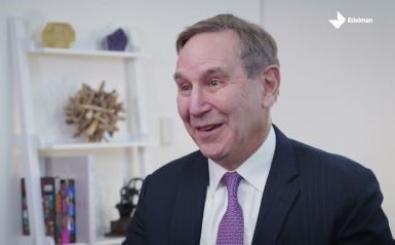On Tuesday 8th October, Valdis Dombrovskis, Executive Vice President and Commissioner Designate for Financial Services “An Economy that Works for People” faced his three-hour public hearing in front of the European Parliament. Facing the Committees for Economic and Monetary Affairs (ECON), Employment (EMPL) and Budgets (BUDG), Dombrovskis was well prepared, he showed his knowledge of his portfolio, and won the backing of MEPs.
With Valdis Dombrovskis returning to the European Commission, he is expected to continue his leading and successful role in steering financial services policy. He is, together with Margrethe Vestager, Executive Vice President and Commissioner-Designate for Competition and Digital Policy, the only member of the Commission that will return to do a very similar portfolio, which signals that we can expect a high level of continuity in this next mandate. We saw MEPs asking questions to Dombrovskis to see whether he could commit to concrete actions and timelines on a range of policies, which means that we can not only expect a raft of legislative activity in the financial services sector generally, but we know that numerous reviews are scheduled for existing policy files.
WHAT DID MEPs FOCUS ON?
- Fair and inclusive economic policies: many S&D MEPs had questions about the social dimension of economic policy, highlighting the focus of his designated job title as one that promises to deliver “an economy that works for people”. Dombrovskis made clear that the green and digital transformation must be combined with social policies. In this context, the European Commission will create a Just Transition Fund to help those most affected by the green transition. MEPs also asked Dombrovskis how he will address platform workers’ rights to fair working conditions as well as fair taxation.
- Boosting the role of finance in sustainability and climate change challenges: top of mind for MEPs were questions around sustainable and green finance. MEPs were keen to hear from the Commissioner Designate exactly how much money would be channeled into green finance. Dombrovskis referred to the support that would come from the European Investment Bank (by increasing its share of climate financing from 25 – 50%), from the EU budget as well as private financing.
- Anti-money laundering rules: this was high on MEPs agenda, with liberal Spanish MEP Luis Garicano asking Dombrovskis if he could commit to an EU wide system to combat money laundering in the EU within the first 100 days of the next Commission. Dombrovskis treaded carefully in this area, cautiously explaining that he sees “merit” in transferring some competences on money laundering to an EU body.
- Scaling up European SMEs: Dombrovskis set out in more detail a Commission initiative to help small and medium-sized enterprises access market-based finance. The Commission’s new initiative will create a dedicated public-private fund to support public offerings of SMEs.
WHAT DID THE DEBATE NOT FOCUS ON?
- Perhaps surprisingly is that the EU’s flagship policies during the last Commission mandate – the Banking Union and the Capital Markets Union – were mentioned by only very few MEPs (although they were referred to in Dombrovskis’ own statement). Dombrovskis highlighted that the EU banking sector is in a much better place than the beginning of the last mandate, and the European Deposit Insurance Scheme would be needed to complete the banking union.
- Brexit was mentioned only once, even though developing capital markets that can rival London in a post-Brexit era will be key for Europe, and we could have expected more discussions around that.
… AND THE PARALLEL DEBATE ONLINE?
- In the online world, the social agenda is a big focus, which echoes some of the debate that was had in the European Parliament around the implementation of the Social Pillar, such as around the Just Transition Fund, the European framework for minimum wage, and the European Unemployment Reinsurance Scheme. The EPP group for instance tweeted that “The #EU stands on the brink of one of the greatest transitions and transformations. Our economies and societies will change profoundly. ‘Business as usual’ is not an option: Europe’s prosperity and unique social market economy model are at stake. #Dombrovskis #EPhearings2019”
- The Commissionner Designate’s plans to propose a law regulating virtual currencies, including Libra, was picked up on in online debates. Although Fintech featured less highly, we can still expect that core to the Commission’s agenda will be to ensure that an adequate regulatory framework for technological developments is put in place.
- Green investment and sustainable finance discussions were important to online commentators.
- Other focuses were about the Commissioner’s plans on capital markets, banking, the international role of the euro and anti-money laundering rules.
SO, WHAT DOES THIS MEAN FOR YOU?
As we’ve seen from the debate in the European Parliament and online, expanding green finance will be crucial for this Commission, and financial services firms can expect to see more and more pressure on how they can contribute to a sustainable environment and to the sustainability debate.
All financial services firms will also need to be ready for any revisions and reviews for existing files. The banking sector can expect to focus on implementing Basel III standards, as well expect more work on nonperforming loans, the backstop to the Eurozone’s resolution fund and the European Deposit Insurance Scheme. Smaller businesses – the ‘backbone’ of the European economy – will see enhanced opportunities for accessing capital, as we will see this Commission continuing its work around the Capital Markets Union.
On the international level, with anti-money laundering discussions as well as the role of the euro, global firms should stay attuned to policy debates happening in Brussels, to better anticipate and understand the regulatory landscape.
HOW CAN EDELMAN HELP?
Edelman is a global communications firm that partners with businesses and organisations to evolve, promote and protect their brands and reputations. In order to ensure that the new 2019-2024 institutional cycle creates a favourable policy, regulatory and business environment for you, it will be necessary to think about embedding new ways of working into your day-to-day role. We would be delighted to continue this conversation at your convenience.
We would be delighted to continue this conversation at your convenience.




